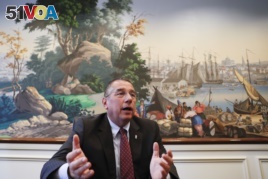15 March, 2018
It is easy for people in Erie, Pennsylvania to blame their city's economic problems on the loss of manufacturing jobs to China and Mexico.
Many Americans, including President Donald Trump, believe that factory closures are the main issue facing aging manufacturing towns in the United States.
Since 2008, Erie has suffered a less-known and possibly more serious loss of well-paying, white-collar jobs. Half of the business leadership positions in Erie — 220 jobs — have disappeared. The city has lost 10 percent of its computer workers, 40 percent of its engineers and 20 percent of its lawyers. The Associated Press says that information comes from a study of government records.
All these jobs helped to support Erie's manufacturing industry. And they are the kind of work that has increasingly become the base of the American economy.

In this Oct. 23, 2017, photo, laboratory personnel work at University of Pittsburgh Medical Center Hamot in Erie, Pa. City leaders in Erie say it needs to retain those white-collar workers, more than it needs a return to a blue-collar past
The AP examined U.S. Department of Labor records dating to 2008. It found that a third of major cities — nearly 80 communities — are losing a greater percentage of white-collar jobs than blue-collar jobs.
In Ohio, cities such as Toledo and Canton have had a harder time keeping jobs in offices than on factory floors. The situation is similar in Sheboygan, Wisconsin; Wichita and Topeka, Kansas; in Birmingham, Alabama and Decatur, Illinois.
"That's one of the most painful aspects of the economic decline of these manufacturing centers: They get hit twice," said Enrico Moretti, an economist at the University of California, Berkeley. "First, they lose the factories. But second, and most importantly, they lose everyone who was supportive of those factories."
Economists worry most about this second-level loss. They believe that cities need white-collar jobs to meet a new economy based on specialized knowledge and technological skill.
Higher-Paying Jobs Leaving Smaller U.S. Cities
During the 2016 election campaign, candidate Trump promised voters that he would bring factory jobs back to areas that had lost them. But the AP study shows how higher-paying jobs are leaving smaller cities, and a generation of workers are following. Such workers could create businesses or serve existing companies if they stayed.
The AP studied employment records by occupation from the federal Bureau of Labor Statistics. It then compared employment numbers for metropolitan areas with national averages. Jobs that were defined as white collar include supervisory, administrative and sales positions. Blue-collar occupations include production, machine operation and transportation positions.
White-collar workers are increasingly moving away from smaller cities and settling in fast-growing areas like Seattle, Nashville, Chicago and Silicon Valley. As those higher-paying occupations become centered in fewer places, the wealth they create is less likely to be passed along to cities with a history of manufacturing.
Making Erie More Appealing
In Erie, many business leaders say the city mainly needs to keep and create more white-collar jobs.
Its largest for-profit employer, Erie Insurance, recently repaired an old building where the U.S. National Guard kept arms and military equipment. The company has also been rebuilding old homes nearby, slowly turning part of the city into a business center.
In addition, Erie Insurance is leading a private $40 million effort to fill downtown Erie with stores and housing. It is hoping that the changes will appeal to other employers and college graduates.

Timothy NeCastro
For the company's chief executive, the project is personal. Tim NeCastro has five adult children; only one has chosen to stay local.
"If this is successful, 10 years from now, two more of my kids will move to Erie," he said. "They will find a reason to get back here."
It is the same issue many small- and middle-size cities face. Children who left for college are mostly not returning home. Many young people are choosing to live in communities close to a major university, like Pittsburgh, Pennsylvania, 200 kilometers south of Erie.
In larger cities, it is easier for white-collar workers to make job changes that offer more money or possibilities for career development. This makes big cities appealing to younger professionals.
For example, Census Bureau records show that Chicago, Illinois, added nearly 40,000 college graduates under age 35 since the Great Recession began in late 2007. Boston, Massachusetts gained about 10,000. Denver, Colorado added 25,000.
However, in the same period, Toledo, Ohio lost 1,600 young college graduates.
In a 2016 campaign speech in Erie, Trump blamed unfair trade for the struggles facing communities across the country. He spoke about the North American Free Trade Agreement and the entrance of China into the World Trade Organization.
"We will stop these countries from taking our companies," Trump said.
The argument helped Trump, the Republican Party nominee, win Erie County. It had voted for Democrat Barack Obama in both the 2008 and 2012 presidential elections. In the 13 months since Trump entered office, Erie has lost about 800 jobs. The number of people seeking jobs dropped by more than 2,000.
Trump has announced taxes on steel and aluminum imports in hopes of strengthening U.S. industry.
I'm Ashley Thompson. And I'm Caty Weaver.
The Associated Press reported this story. George Grow adapted the report for VOA Learning English. Caty Weaver was the editor.
_______________________________________________________________
Words in This Story
white-collar – adj. of or related to office workers
blue-collar – adj. of or related to people who work in a factory
aspect – n. the way something appears; a part of something
decline – n. a process of becoming worse or weaken in condition
graduate – n. someone who completed a study program at a school, college or university
metropolitan – adj. of or relating to a large city as well as nearby cities and towns
We want to hear from you. Write to us in the Comments Section.